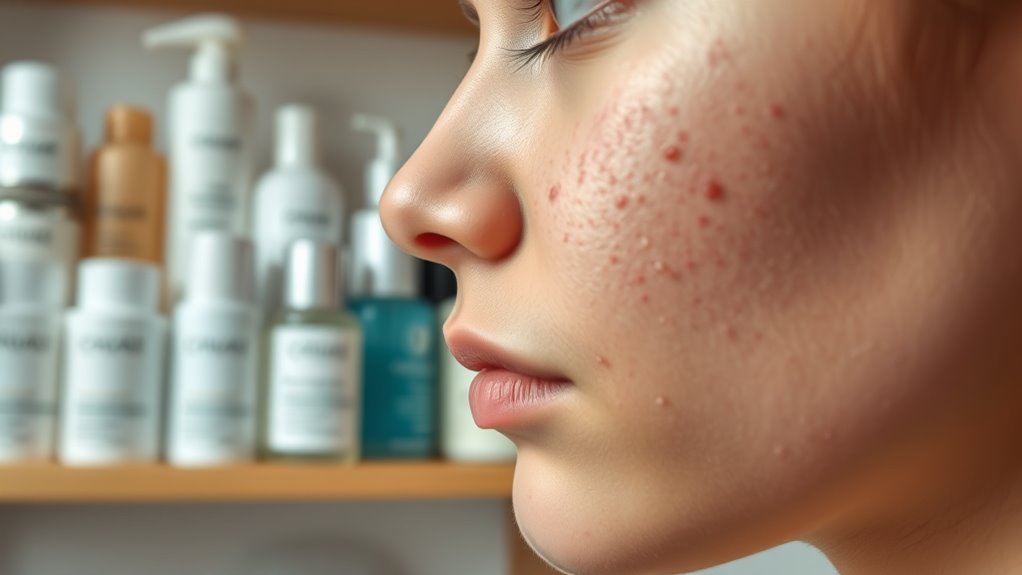This Could Be the Real Reason You Still Get Acne
If you’re still dealing with acne, hormonal fluctuations, diet, stress, and environmental factors could be to blame. Hormones trigger increased oil production that clogs pores, while a diet high in refined sugars and dairy can worsen breakouts. Stress raises cortisol levels, leading to more oil and inflammation. Additionally, pollutants can irritate your skin and disrupt its barrier. Understanding these elements can help you manage your acne more effectively—there’s more to explore about your skin’s needs.
Hormonal Fluctuations and Their Impact
When you experience hormonal fluctuations, they can significantly impact your skin’s health, often triggering acne. These changes lead to increased oil production, clogging pores and promoting breakouts. Effective acne solutions may include over-the-counter spot treatments containing benzoyl peroxide or salicylic acid, which target the bacteria and reduce inflammation. Salicylic acid is particularly effective in regulating sebum production and maintaining pH balance, making it a beneficial addition to your skincare regimen. Understanding your skin’s response to hormones can help you choose appropriate care methods.
Diet and Lifestyle Choices
Hormonal fluctuations aren’t the only factors influencing acne; your diet and lifestyle choices play a significant role as well.
A diet high in refined sugars and dairy products can exacerbate breakouts by increasing insulin levels, while inadequate hydration and poor sleep can disrupt skin health.
Incorporating whole foods, managing stress, and staying active can promote clearer skin and overall well-being. Additionally, a balanced diet rich in anti-inflammatory foods can substantially improve skin clarity and reduce breakouts.
Skincare Products: The Good, The Bad, and The Ugly
Although it’s easy to assume that all skincare products contribute positively to skin health, the reality is more complex.
Some products contain irritants, fragrances, or comedogenic ingredients that can exacerbate acne.
Conversely, beneficial ingredients like salicylic acid, retinoids, and niacinamide can help treat and prevent breakouts.
It’s crucial to read labels and choose products tailored to your specific skin type to achieve optimal results. Consistent application of salicylic acid is essential for reducing pore congestion and preventing future breakouts.
Stress and Acne: The Hidden Connection
Stress can significantly influence your skin health, and the connection between stress and acne is well documented in scientific literature.
When you’re under stress, your body produces cortisol, which can increase oil production in your skin. This excess oil can clog pores, leading to breakouts.
Additionally, stress may also promote inflammation, worsening acne.
Managing stress effectively is crucial for maintaining clear skin. Incorporating deep breathing techniques can help lower cortisol levels and improve your skin’s condition.
Environment and Pollution: External Triggers
Acne doesn’t just stem from internal factors like stress; external elements play a significant role too.
Environmental pollutants, such as smog and dust, can clog pores, promoting inflammation and bacterial growth.
Additionally, exposure to harsh chemicals in skincare products can disrupt your skin’s natural barrier, exacerbating acne.
Understanding these external triggers is crucial for effectively managing and preventing breakouts in your daily life. Furthermore, environmental stressors like extreme temperatures and pollution can further irritate sensitive skin, contributing to the persistence of acne.
The Role of Genetics in Acne Susceptibility
While environmental factors are significant, genetics plays a crucial role in determining your susceptibility to acne. Understanding this can help you manage your skin better.
Consider these genetic factors:
-
Family history of acne
-
Hormonal variations influenced by genes
-
Oil gland activity linked to heredity
-
Skin type, determined genetically
Recognizing these can help tailor your approach to skincare and treatment. Additionally, your genetic predisposition may affect oil gland activity, which is directly linked to acne development and severity.

